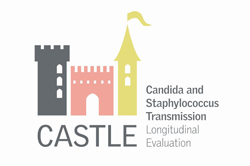CASTLE
Candida and Staph Transmission: Longitudinal Evaluation
about

What is the study about?
The CASTLE study was initiated to investigate the roles played by Candida and Staphylococcus aureus in nipple and breast pain among breastfeeding women.
Most women who are breastfeeding do not experience any breast infections. However about one woman in five will develop a breast infection, such as mastitis. At present, it is not known whether burning nipple pain associated with radiating breast pain is caused by a fungal infection (Candida albicans, known as "thrush") or a bacterial infection (Staphylococcus aureus, known as "Golden Staph"). Therefore the aim of the CASTLE study is to investigate the role of these micro-organisms in nipple and breast pain among breastfeeding women.
How are we doing this?
We recruited women who are planning to breastfeed at the Royal Women's Hospital and Frances Perry House. Women were recruited in late pregnancy and we obtained two swabs from the woman at this time point to get an indication of Candida and S. aureus colonisation before the birth. We followed the woman through until eight weeks after birth, taking nasal and nipple swabs and breast milk samples at five defined time points. We also obtained nasal and oral swabs from her baby. These swabs are used to detect the presence of Candida or Staphylococcus and allow us to track these microorganisms over time. We carried out this microbiological analysis in conjunction with questionnaires at each time point. These questionnaires ask specific questions relating to mothers' health and breastfeeding problems. Therefore we are using all of this information to address the role played by these microorganisms in nipple and breast pain.
publications
Amir LH, Cullinane M, Garland SM, Tabrizi SN, Donath SM, Bennett CM, Cooklin AR, Fisher JR, Payne MS. The role of micro-organisms (Staphylococcus aureus and Candida albicans) in the pathogenesis of breast pain and infection in lactating women: study protocol. BMC Pregnancy Childbirth 2011; 11: 54
Amir LH, Donath SM, Garland SM, Tabrizi SN, Bennett CM, Cullinane M, Payne MS. Does Candida and/or Staphylococcus play a role in nipple and breast pain in lactation? A cohort study in Melbourne, Australia. BMJ Open 2013; 3(3): e002351
Buck M, Amir LH, Cullinane M, Donath SM, CASTLE study team. Nipple pain, damage and vasospasm in the first eight weeks postpartum. Breastfeed Medicine 2014; 9(1):56-62
Cooklin AR, Amir LH, Jarman J, Cullinane M, Donath SM, The CASTLE Study Team. Maternal physical health symptoms in the first 8 weeks postpartum among primiparous Australian women. Birth 2015; 42(3):254-60
Buck ML, Amir LH, Donath SM. Topical treatments used by breastfeeding women to treat sore and damaged nipples. Clinical Lactation 2015; 6(1):16-23
Payne MS, Cullinane M, Garland SM, Tabrizi SN, Donath SM, Bennett CM, Amir LH. Detection of Candida spp. in the vagina of a cohort of nulliparous pregnant women by culture and molecular methods: Is there an association between maternal vaginal and infant oral colonisation? Aust NZJ Obstet Gynaecol 2016; 56(2):179-84
Cooklin AR, Amir LH, Nguyen CD, Buck ML, Cullinane M, Fisher JRW, Donath SM, the CASTLE Study Team. Physical health, breastfeeding problems and maternal mood in the early postpartum: a prospective cohort study. Arch Womens Ment Health 2018; 21(3):365–74
Amir LH, Donath SM, Cullinane M, Buck ML, CASTLE Study Team. Intended breastfeeding duration predicts infant formula use in the early postpartum period. Breastfeeding Review 2019; 27(3): 7–14
Buck M, Amir LH, McDonald K. ‘Not at all what I had imagined or been prepared for.’ Women’s experiences of becoming a breastfeeding mother. Breastfeeding Review 2020; 28(2) 15-25
Cullinane M, Schofield L, Murray GL, Payne MS, Bennett CM, Garland SM, Amir LH. Random Amplified Polymorphic DNA analysis reveals no clear link between Staphylococcus epidermidis and acute mastitis. Aust N Z J Obstet Gynaecol 2022; 62(4):605-609
more information
Who is funding the study?
This is an eighteen month project funded by the National Health and Medical Research Council of Australia (NHMRC).
Privacy and access to information
Information collected is kept confidential and the data will be used only for the purposes of this study. We have research ethics approval to conduct the CASTLE project.
For more information about the CASTLE study, please contact Dr Lisa Amir (l.amir@latrobe.edu.au) or Dr Meabh Cullinane (m.cullinane@latrobe.edu.au).